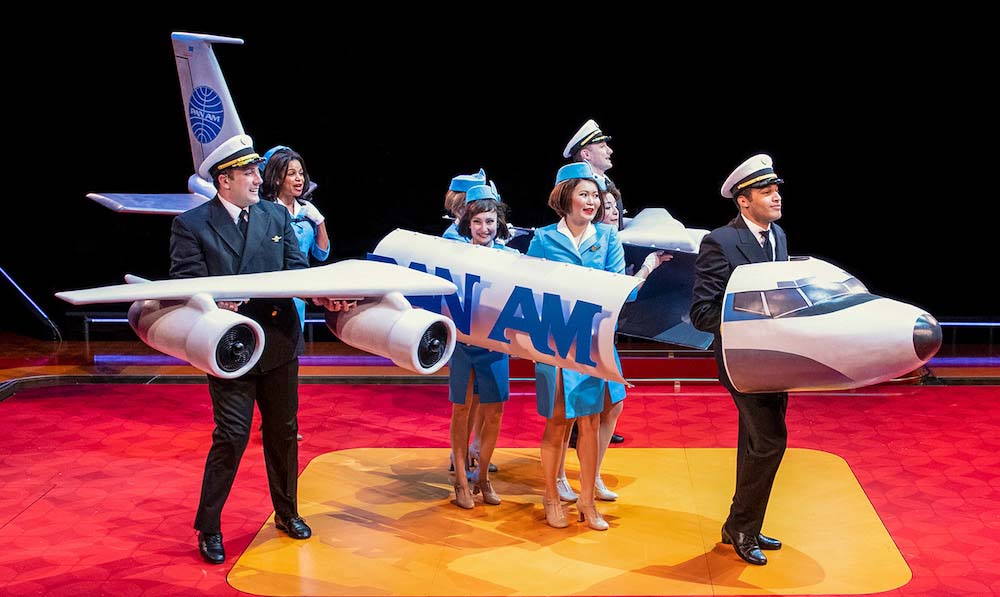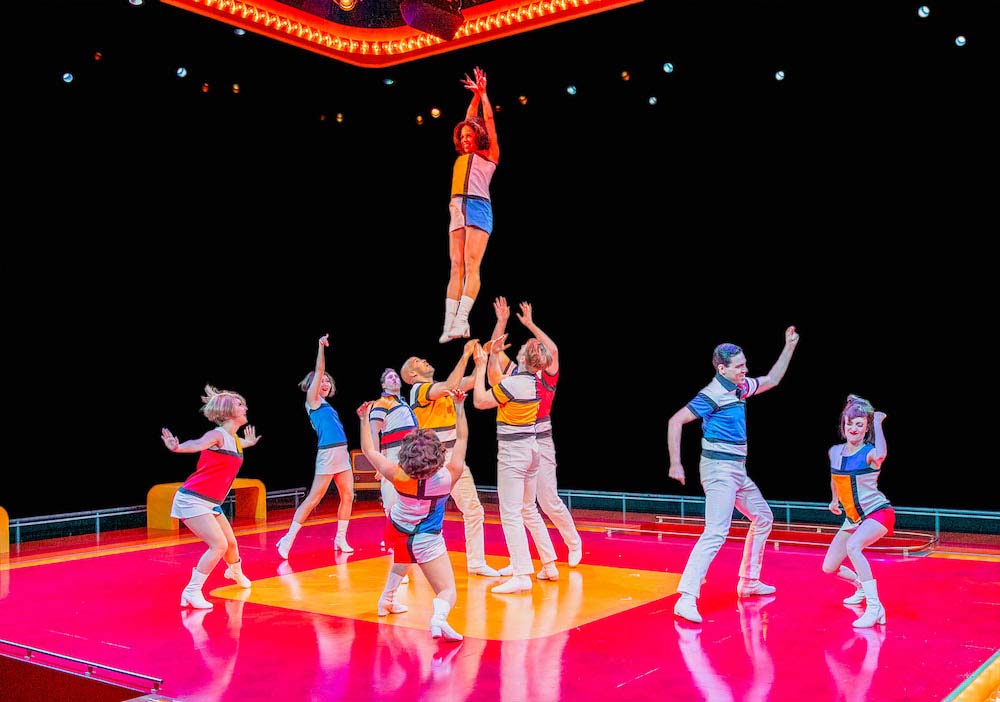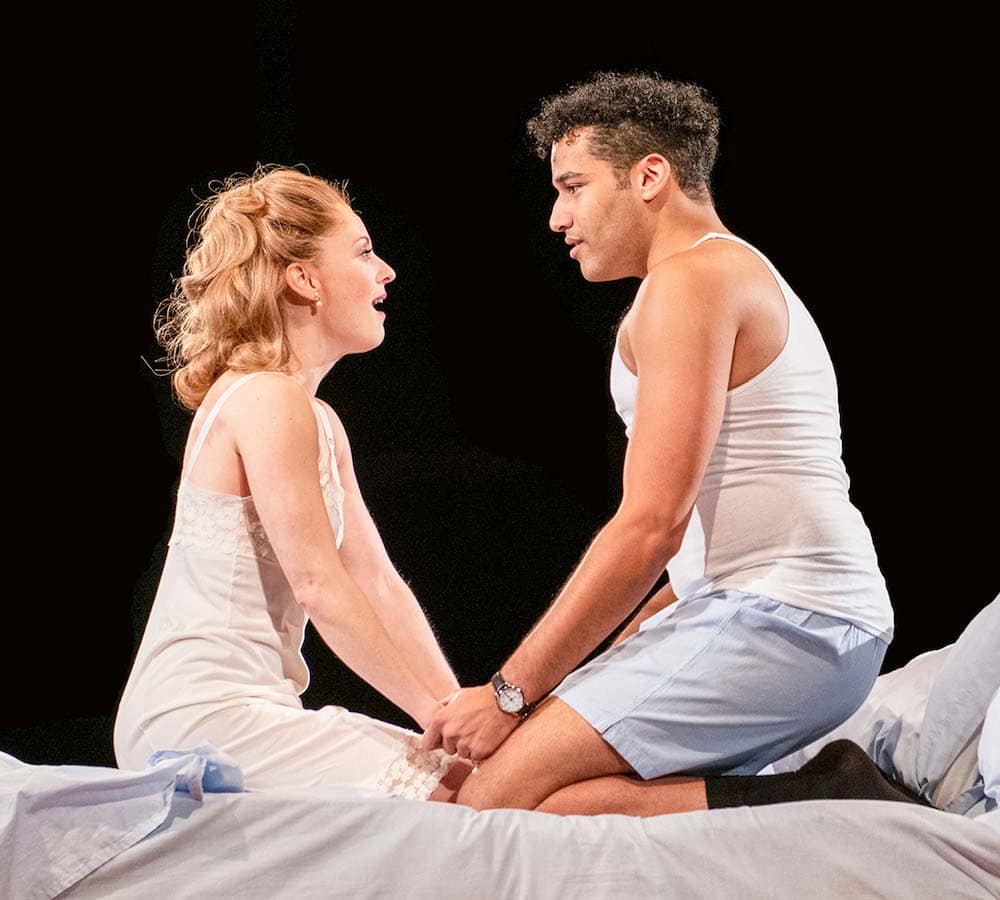The art of the con is as American as baseball, apple pie, and Chevrolet. From three-card monte dealers to hustlers, swindlers, Wall Street bankers to — can it be — an ex-president? Confidence men — and women — have a way with persuasion. These days those who Netflix and chill have likely come across Anna (Inventing Anna) Sorokin — the so-called German heiress who duped bankers, hoteliers, and big money New Yorkers out of millions — and the “Tinder Swindler” — Shimon Heyada Hayut — an Israeli who posed as the son of a diamond dealer and swindled women on three continents out of millions. Most of these stories have no happy endings or song and dance numbers.
But Frank Abegnale Jr.’s tale of how he pretended to be a Pan Am co-pilot, a doctor, a teacher, and a lawyer while on the run from the FBI for bank fraud is a wild and crazy ride that inspired the Steven Spielberg movie Catch Me If You Can and the 2011 Broadway musical of the same name.

Arena Stage has caught the con bug with its latest production of this irreverent retro 1960s man-on-the-run tale. Artistic Director Molly Smith’s Catch Me If You Can features a rejiggered book, with some script changes drawn from the book writer Terrence McNally’s drafts, along with two never-before-heard musical numbers — “50 Checks” and “Here I Am to Save the Day” — composed by Marc Shaiman and Scott Wittman (who was in the audience opening night). As Smith said that evening, every musical has plenty of songs that don’t make it into the final production.
The show is fast-paced, high flying, and just a tad cheeky in following the trail of ne’er do well kid Frank Abagnale Jr., from his ordinary teenage life in suburban New York to a scheming con man with a yen for nice suits, pretty women, and the thrill of the chase.
Alexander Dodge’s set leans into mod 1960s design on the spare square stage with stripes of yellow, orange, and red — think the 1970s Metro car seats — molded plastic chairs, and hot yellow lights rimming the space. From Mondrian-styled polo shirts and shift dresses for the chorus, to Audrey Hepburn dresses and Jackie O. pillbox hats for the ladies, and sharp charcoal two-button suits and fedoras for the men, Costume Designer Alejo Vietti captures the ‘60s vibe down to the chunky-heeled, calf-high, white go-go boots the dancers wear (And, yes, I want a pair). And nothing says ‘60s more than high-styled hair, either ladies bouffants or long ‘dos with flips or close-cropped side-parted cuts for the guys, with a nod to Wig Designer Charles LaPointe.

As chic and stylized as the production looks and sounds under the vivacious musical direction of Laura Bergquist, the lead performances lack a certain pizazz to draw one into the compelling cat-and-mouse game and get you rooting for “bad guy” con man Frank Jr. That may be due to Christian Thompson’s vision of Frank Jr. as a nice guy, and he is super nice, with a gleaming smile, but he lacks the edgy wariness or deceit that this character carries under his slick surface.

McNally structured the play with a game show–like premise, allowing Thompson to break through the fourth wall on occasion, but there’s no wry wink — instead, it’s all gloss and glitz. Thompson’s foil is Nehal Joshi, familiar to Arena audiences, in the role of FBI agent Carl Hanratty, a rumpled G-man married to his job. Joshi attends to the shadings in Hanratty, letting his cranky, loner traits drive him to obsess over catching this most-wanted criminal. The chase lasts so many years, Frank Jr. calls Hanratty every Christmas from a different destination — part taunt, part needy attempt to connect with someone, anyone, who cares about him.
Frank Jr.’s father, Frank Sr., is a blowhard dreamer, a smooth-talker who unravels as his runaway son’s star soars. And Jeff McCarthy pays the model bad father — inattentive, uninterested, self-absorbed, and wounded by his own bad father, passing on that generational hurt to the next. Stephanie Pope Lofgren as the household’s mother is luscious in every way, her sensuous curves accentuated by tight-fitting, low-cut glam dresses, and her sultry voice — with a mediocre French accent — entices as much as her figure. In Act Two, while posing as a doctor, Frank Jr. encounters Brenda Strong — Hayley Podschun — a new nurse. Soon he’s smitten enough to settle down, and Podschun belts “Fly, Fly Away” — not quite an 11 o’clock number but close.

Catch Me If You Can mines a catalog of genres from bright big band sounds to blues, jazz, R&B, and bespoke chorus numbers that sound like they could have come from NBC’s old Dean Martin Show with its the leggy, all-female singer/dancers the Golddiggers. The highlight of Arena’s production has to be the choreography, executed with sassy precision by a chorus of finely tuned song and dance men and women.
Parker Esse, a long-time choreographic collaborator with Molly Smith on Arena’s musicals, here is in his element with classic jazz numbers with a strong nod to both iconic choreographers Bob Fosse — slouchy shoulders, jazz hands, liquidy hips punctuated with a pop, all topped off by staccato isolations of body parts — and the father of theatrical jazz, Jack Cole — with his quick-footed locomotor patterns, precision head, arm, and finger patterns, and jazzy syncopations. Both Cole and Fosse influence the stylized jazz riffs that Esse fills with leggy lunges, kick-ball-changes into pirouettes, angular jumps, and mod jerky go-go arms. The cast, fully decked out in ‘60s fashions, attack each Esse number with precision and aplomb, the women leggy and sexy, the men clean-cut and stalwart. It’s sexy and fun-filled with verve and tongue-in-cheek moments — like the number “Jet Set” where the pilots and stewardesses form a kick line then carry on plastic oversized wings, a jet tail, and a nose to put together a mini Pan Am airplane. Cheesy? Sure. But, hey, so were the ‘60s.
Most challenging for Esse, Smith, and the terrific chorus is what the cramped-feeling theater-in-the-square stage does to hamper the swank and slick choreography. Esse deserves more space to let these dances breathe and expand to their fullest. Alas, Arena’s Fichandler Stage, itself a product of the experimental, swinging ‘60s, is what hems in the best part of this production of Catch Me If You Can.
Running Time: Approximately two hours 25 minutes including a 15-minute intermission.
Catch Me If You Can plays through April 17, 2022, on the Fichandler Stage at Arena Stage, 1101 Sixth Street SW, Washington, DC. Tickets ($66–$125) may be purchased online by phone at 202-488-3300, or at the Arena Stage sales office Tuesday through Saturday from noon until 8 p.m. For information on programs such as pay-your-age tickets, student discounts, Southwest Nights, and hero’s discounts, visit arenastage.org/tickets/savings-programs.
The Catch Me If You Can Program is online here.
COVID Safety: Proof of vaccination against COVID-19 and photo identification must be shown to enter the building and masks must be worn in the building. Arena’s complete safety protocols are here.




